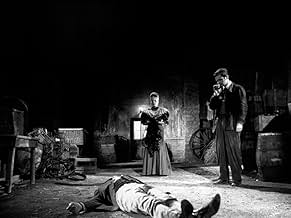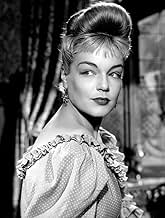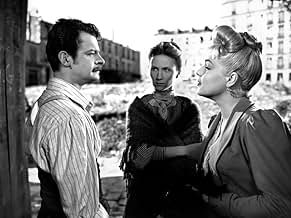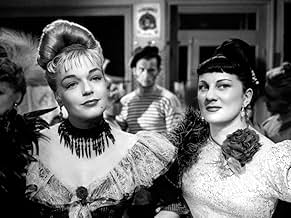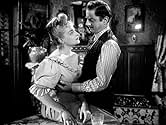NOTE IMDb
7,6/10
6,5 k
MA NOTE
Dans la France de la Belle Époque, trois voyous et un ancien escroc devenu charpentier tombent amoureux de la même femme, une sublime créature à la chevelure dorée.Dans la France de la Belle Époque, trois voyous et un ancien escroc devenu charpentier tombent amoureux de la même femme, une sublime créature à la chevelure dorée.Dans la France de la Belle Époque, trois voyous et un ancien escroc devenu charpentier tombent amoureux de la même femme, une sublime créature à la chevelure dorée.
- Réalisation
- Scénario
- Casting principal
- Victoire aux 1 BAFTA Award
- 2 victoires et 2 nominations au total
Solange Certain
- L'amie de Paulo
- (as Solange Certin)
Émile Genevois
- Billy - membre de la bande
- (as Emile Genevois)
Avis à la une
Despite the corsets and petticoats and horse-drawn cabs, this lush, richly textured film has more in common with the bleak, fatalistic modern-dress films of the period than with conventional historical romance. The action takes place over the course of only a few days, but in France that's long enough for a passion strong enough to change a life, or end it--more than one man dies because of the bewitching Marie and her golden hair that shines like the sun. The intensity of the characters' emotions and the suddenness of their violence is powerfully countered by the reserve of the playing--of the solemn, laconic toughs and of Simone Signoret as Marie. In moments of great emotion, her slight smile changes to a broad one, but with her lips still closed. There's none of the giggling and wriggling that marked the other blonde Fifties sex symbols, Bardot and Monroe, and countless others since, and obviously no nudity, total or partial, but in her morning-after scene with Serge Reggiani, you can practically smell smoke.
Like Zola's Nana, Marie is neither a villain nor a victim, simply an elemental force of nature. This elemental-woman business can, in French and non-French movies, be pretentious and unwittingly comic, but there's none of that here, because neither Signoret nor the director indulge in any fancy dialogue or vocal tricks to play up how alluring she is--they don't have to. We are always aware of Marie as a figure of enormous strength, with a broad, strong back, round shoulders spilling out of her blouse, and a mouth too wide for coyness.
In an otherwise favourable review, Pauline Kael said that the film's tone was slightly trashy, as if it were saying, of the low-life characters, "Look, they have feelings too." I disagree--the scene of the wealthy, slumming group in evening dress who find the characters "marvelously amusing" show us what Becker thinks of that viewpoint and implicitly reproaches anyone who shares it.
Like Zola's Nana, Marie is neither a villain nor a victim, simply an elemental force of nature. This elemental-woman business can, in French and non-French movies, be pretentious and unwittingly comic, but there's none of that here, because neither Signoret nor the director indulge in any fancy dialogue or vocal tricks to play up how alluring she is--they don't have to. We are always aware of Marie as a figure of enormous strength, with a broad, strong back, round shoulders spilling out of her blouse, and a mouth too wide for coyness.
In an otherwise favourable review, Pauline Kael said that the film's tone was slightly trashy, as if it were saying, of the low-life characters, "Look, they have feelings too." I disagree--the scene of the wealthy, slumming group in evening dress who find the characters "marvelously amusing" show us what Becker thinks of that viewpoint and implicitly reproaches anyone who shares it.
Jacques Becker's CASQUE D'OR (Golden Helmet 1952), an underworld romance set in Paris during "La Belle Epoque", stars Simone Signoret as the titular blonde prostitute who's star-crossed amour reveals the agony and ecstasy of love. The buxom Signoret plays Marie, the moll of an Apache gangster, who meets Manda, an ex-con gone straight, at an al fresco dance hall and it's love at first sight for both of them. The pair soon throw caution to the wind, setting off a chain-reaction of jealousy, murder, double-crosses, and revenge that can only end in tragedy. All of the characters are sharply etched but it's Simone Signoret's Marie who literally shines. The tough and tender demimonde can't take her eyes off Manda (a quiet, determined Serge Reggiani) from the moment they meet until the bitter end and she's often bathed in an ethereal light. The duplicity-free Marie is also the quintessential femme fatale who proves bad luck to any man who covets her. The era is imaginatively realized and a number of scenes are reminiscent of Impressionist paintings yet, like Marie's unconscious duality, there's darkness in the light with an undercurrent of understated but potent sex and violence. Highly recommended and loosely based on an incident in the life of a bisexual bonvivant, one Amélie Hélie:
"The bands of roughnecks of Belleville were also a passionate lot, not like the cynical pimps of Montmartre and La Chapelle. Here a man took out a knife for a girl he really cared for. In 1902 the story of 'Casque d'Or' made the headlines throughout Paris, both east and west. Two enemy bands of Apaches Mohicans de Paris - sporting their customary insignia of caps, bell-bottom trousers and polka-dotted scarves, had taken to the streets that lay between Belleville and Charonne: 'Le Popincourt' headed by the Corsican Leca, 'Les Orteaux' by Manda, l'Homme! The object of their dispute was not territory but a girl called Amélie Hélie, nicknamed 'Casque d'Or', with a stunning, golden-reddish mane. The confrontation turned into a fullscale pitched battle on Rue des Haies, in which neither knife blades nor guns were spared. To the inquisitive public prosecutor Manda retorted during his trial: 'We fought each other, the Corsican and myself, because we love the same girl. We are crazy about her. Don't you know what it is to love a girl?' Manda was unquestionably a soulmate of Piaf. Condemned to deportation and hard labour - Manda for life, Leca for eight years - the two men met on the island of Saint-Martin-de-Ré. When finally they spoke to each other, it was about 'Casque d'Or'. She meanwhile wasted no time bewailing her unfortunate suitors, but turned for solace to the world of entertainment and the company of wealthier men. However, one of Leca's faithful followers had been contemplating revenge and stabbed her one night in the establishment where she sang. Although she survived, she could no longer perform as a singer and it is only thanks to her portrayal by the legendary Simone Signoret in Jacques Becker's movie that she has not fallen into oblivion. The real Amélie Hélie ended by marrying an ordinary workman and died forgotten on 16 April 1933. She was buried in the cemetery of Bagnolet."
CASQUE D'OR's release was briefly delayed when Amélie's widower attempted to take out an injunction against it, claiming the film invaded his late wife's privacy. The case was soon thrown out when it was revealed that Hélie had appeared on stage, playing herself, in a drama entitled "Casque d'or et les Apaches".
"The bands of roughnecks of Belleville were also a passionate lot, not like the cynical pimps of Montmartre and La Chapelle. Here a man took out a knife for a girl he really cared for. In 1902 the story of 'Casque d'Or' made the headlines throughout Paris, both east and west. Two enemy bands of Apaches Mohicans de Paris - sporting their customary insignia of caps, bell-bottom trousers and polka-dotted scarves, had taken to the streets that lay between Belleville and Charonne: 'Le Popincourt' headed by the Corsican Leca, 'Les Orteaux' by Manda, l'Homme! The object of their dispute was not territory but a girl called Amélie Hélie, nicknamed 'Casque d'Or', with a stunning, golden-reddish mane. The confrontation turned into a fullscale pitched battle on Rue des Haies, in which neither knife blades nor guns were spared. To the inquisitive public prosecutor Manda retorted during his trial: 'We fought each other, the Corsican and myself, because we love the same girl. We are crazy about her. Don't you know what it is to love a girl?' Manda was unquestionably a soulmate of Piaf. Condemned to deportation and hard labour - Manda for life, Leca for eight years - the two men met on the island of Saint-Martin-de-Ré. When finally they spoke to each other, it was about 'Casque d'Or'. She meanwhile wasted no time bewailing her unfortunate suitors, but turned for solace to the world of entertainment and the company of wealthier men. However, one of Leca's faithful followers had been contemplating revenge and stabbed her one night in the establishment where she sang. Although she survived, she could no longer perform as a singer and it is only thanks to her portrayal by the legendary Simone Signoret in Jacques Becker's movie that she has not fallen into oblivion. The real Amélie Hélie ended by marrying an ordinary workman and died forgotten on 16 April 1933. She was buried in the cemetery of Bagnolet."
CASQUE D'OR's release was briefly delayed when Amélie's widower attempted to take out an injunction against it, claiming the film invaded his late wife's privacy. The case was soon thrown out when it was revealed that Hélie had appeared on stage, playing herself, in a drama entitled "Casque d'or et les Apaches".
10jotix100
Jacques Becker's "Casque d'or" is a fine example of the best in the French cinema. At times, this splendid 1954 film, keeps reminding us about paintings of the impressionist school, especially Renoir, because it takes us back to that era. In fact, the beginning of the film almost gives the impression we are witnessing characters that inspired the painters of that art movement.
"Casque d'or" is enhanced by the magnificent black and white photography of Robert Lefevbre who has a poetic way to get the best of what M. Becker intended him to do. The atmospheric music of Georges Van Parys takes the viewer back to those places one has seen in different paintings of that era.
The lovely young woman at the center of the picture, Marie, gets taken with Manda the moment he enters the country restaurant where she is seen with some of the petty criminals she is friendly with. One realizes this is a passion that is not meant to be from the start. Marie belongs to one of the Felix Leca's gang. When Roland senses his girl has an eye for another man, he wants to take get rid of him.
Georges Manda has also been to jail, but now is a carpenter and trying to go straight. Fate is not kind to Manda, who, when provoked, reveals he is not to be made a fool. Leca, who is also quite smitten by Marie's beauty plans to get rid of Manda so he can have the blonde woman all to himself. Leca, who knows his way around the law, and is friendly with the police, will prove to be Manda's undoing.
What Jacques Becker achieved with this film was to create the right atmosphere to set his story. Working in France he had the access to the great movie locations one sees in the movie. The film evokes that period convincingly. The director adds touches, that even when watched today, are a delight to watch.
M. Becker got good performances out of his cast. Simone Signoret at that point of her life was at her prime. Her Marie is a fine example of what she was able to project without much effort. Her beauty is evident and she plays Marie with elegance. Serge Reggiani plays Manda with conviction. M. Reggiani covered quite a lot of ground in the French cinema. Aside from his good looks, he was an accomplished actor and singer. His contribution to our enjoyment of the film made "Casque d'or" to be a classic it became. Claude Dauphin is Felix Leca, the unscrupulous man in love with Marie who will stoop so low in order to get the woman that he wouldn't have otherwise. M. Dauphin conveys the evil in Felix Leca with an economy that works well in his portrayal of this sophisticated monster.
Finally, this is Jacques Becker's triumph. "Casque d'or" is one of the best films of all times.
"Casque d'or" is enhanced by the magnificent black and white photography of Robert Lefevbre who has a poetic way to get the best of what M. Becker intended him to do. The atmospheric music of Georges Van Parys takes the viewer back to those places one has seen in different paintings of that era.
The lovely young woman at the center of the picture, Marie, gets taken with Manda the moment he enters the country restaurant where she is seen with some of the petty criminals she is friendly with. One realizes this is a passion that is not meant to be from the start. Marie belongs to one of the Felix Leca's gang. When Roland senses his girl has an eye for another man, he wants to take get rid of him.
Georges Manda has also been to jail, but now is a carpenter and trying to go straight. Fate is not kind to Manda, who, when provoked, reveals he is not to be made a fool. Leca, who is also quite smitten by Marie's beauty plans to get rid of Manda so he can have the blonde woman all to himself. Leca, who knows his way around the law, and is friendly with the police, will prove to be Manda's undoing.
What Jacques Becker achieved with this film was to create the right atmosphere to set his story. Working in France he had the access to the great movie locations one sees in the movie. The film evokes that period convincingly. The director adds touches, that even when watched today, are a delight to watch.
M. Becker got good performances out of his cast. Simone Signoret at that point of her life was at her prime. Her Marie is a fine example of what she was able to project without much effort. Her beauty is evident and she plays Marie with elegance. Serge Reggiani plays Manda with conviction. M. Reggiani covered quite a lot of ground in the French cinema. Aside from his good looks, he was an accomplished actor and singer. His contribution to our enjoyment of the film made "Casque d'or" to be a classic it became. Claude Dauphin is Felix Leca, the unscrupulous man in love with Marie who will stoop so low in order to get the woman that he wouldn't have otherwise. M. Dauphin conveys the evil in Felix Leca with an economy that works well in his portrayal of this sophisticated monster.
Finally, this is Jacques Becker's triumph. "Casque d'or" is one of the best films of all times.
After being released from prison where he served five years for an undisclosed crime, Georges Manda (Serge Reggiani), a soft-looking, taciturn man with a handlebar moustache, becomes a hard working carpenter, determined to go straight. When Raymond (Raymond Bussieres), a fellow gang member with whom he served time in prison, introduces him to Marie (Simone Signoret) at a dance, however, the solid foundation he was trying to build begins to come unglued. Signoret, one of the classiest and most elegant actresses, is strikingly irresistible as the moll of a suave gang leader in Jacques Becker's 1952 masterpiece Casque D'or. Considered a failure when it first opened but, after receiving critical acclaim in New York, the film developed a wider audience in France and has now become a classic, newly restored on a Criterion DVD.
Set in Paris in the 1890s and based on actual police accounts, Casque D'or is not an arid period piece or costume drama, but a rich, vibrant, and lovingly evocative work that successfully recreates the ambiance of Paris at the turn of the century. Unlike Melville's Le Samourai which was filmed in near darkness to capture the sullen milieu of the underworld, Becker bathes his film in a dazzling poetic light that belies the darkness of its theme and some scenes have been compared to an impressionist painting. Marie is being "kept" by Roland (William Sabatier), a volatile and jealous dandy and is also sought after by the crime boss Felix Leca (Claude Dauphin). Manda and Marie fall in love but soon Manda runs afoul of the law after killing the jealous Roland in a fight. Leca seizes on this opportunity to remove Manda from the picture by framing his closest friend but doesn't count on Manda's dedication to doing what is right.
Despite being about the criminal element, there is little violence in Casque D'or and it is more of an moody romance than a crime drama, perhaps accounting for its initial failure at the box office. The most brilliantly realized sequence takes place at a countryside retreat where Manda and Marie go for a few hours of happiness together before the inevitable denouement. Casque D'or is a film about friendship, loyalty, and, most of all, about passion and its consequences. When Marie hears wedding bells and drags Manda into a church, all he can say is "not now", but his expression suggests that he knows that their love will be a dream that fades into dawn.
Set in Paris in the 1890s and based on actual police accounts, Casque D'or is not an arid period piece or costume drama, but a rich, vibrant, and lovingly evocative work that successfully recreates the ambiance of Paris at the turn of the century. Unlike Melville's Le Samourai which was filmed in near darkness to capture the sullen milieu of the underworld, Becker bathes his film in a dazzling poetic light that belies the darkness of its theme and some scenes have been compared to an impressionist painting. Marie is being "kept" by Roland (William Sabatier), a volatile and jealous dandy and is also sought after by the crime boss Felix Leca (Claude Dauphin). Manda and Marie fall in love but soon Manda runs afoul of the law after killing the jealous Roland in a fight. Leca seizes on this opportunity to remove Manda from the picture by framing his closest friend but doesn't count on Manda's dedication to doing what is right.
Despite being about the criminal element, there is little violence in Casque D'or and it is more of an moody romance than a crime drama, perhaps accounting for its initial failure at the box office. The most brilliantly realized sequence takes place at a countryside retreat where Manda and Marie go for a few hours of happiness together before the inevitable denouement. Casque D'or is a film about friendship, loyalty, and, most of all, about passion and its consequences. When Marie hears wedding bells and drags Manda into a church, all he can say is "not now", but his expression suggests that he knows that their love will be a dream that fades into dawn.
In a poll in 1979 ,Becker's chef d'oeuvre was part of the top ten of the best French movies of all time.
It's arguably Becker's best work;he achieved a luminous movie with many unforgettable scenes : -the small boats on the river,and the pack arriving at the guinguettes,those cafes down by the river Seine which are no longer part of the landscapes.(remember Duvivier's "la belle équipe" ,1936) -all the scenes in the country where the nature seems to protect the lovers as a mother would do.Most of all,this admirable sequence when Reggiani 's sleeping :he opens his eyes and Marie's luminous beauty moves him deeply -never a director filmed Signoret as Becker did- -The scene which climaxes the opus is the one in the church.They hear the whole congregation sing the "Kyrie " in a tiny church:there's a wedding there.So Marie urges Manda to come in and they attend the ceremony.When they leave ,they learn tragic news.Now the bell is tolling for them,even if these are wedding bells.
-The final scenes between Reggiani/Manda and his old pal Bussières /Raymond display Becker's love of loyalty,manly friendship ,a subject which would come back in later works ,muted in "touchez pas au grisbi" and became an absolute pessimism in "le trou" where nobody could be trusted anymore.
-The score which Becker used in the last sequences is none other than the old French folk song "le temps des cerises" actually an organizing song,a revolutionary song ,since it was the anthem of the Commune in 1871.
"Casque d'or" is one of the jewels of the French cinema.Becker used to like the Apaches (=ruffians) ,the outcast,cause he would transfer Leblanc's Arsene Lupin adventures to the screen in 1957.A failed attempt though.But "Casque d'or" generally looked upon as Becker's peak ,hasn't aged a bit.
It's arguably Becker's best work;he achieved a luminous movie with many unforgettable scenes : -the small boats on the river,and the pack arriving at the guinguettes,those cafes down by the river Seine which are no longer part of the landscapes.(remember Duvivier's "la belle équipe" ,1936) -all the scenes in the country where the nature seems to protect the lovers as a mother would do.Most of all,this admirable sequence when Reggiani 's sleeping :he opens his eyes and Marie's luminous beauty moves him deeply -never a director filmed Signoret as Becker did- -The scene which climaxes the opus is the one in the church.They hear the whole congregation sing the "Kyrie " in a tiny church:there's a wedding there.So Marie urges Manda to come in and they attend the ceremony.When they leave ,they learn tragic news.Now the bell is tolling for them,even if these are wedding bells.
-The final scenes between Reggiani/Manda and his old pal Bussières /Raymond display Becker's love of loyalty,manly friendship ,a subject which would come back in later works ,muted in "touchez pas au grisbi" and became an absolute pessimism in "le trou" where nobody could be trusted anymore.
-The score which Becker used in the last sequences is none other than the old French folk song "le temps des cerises" actually an organizing song,a revolutionary song ,since it was the anthem of the Commune in 1871.
"Casque d'or" is one of the jewels of the French cinema.Becker used to like the Apaches (=ruffians) ,the outcast,cause he would transfer Leblanc's Arsene Lupin adventures to the screen in 1957.A failed attempt though.But "Casque d'or" generally looked upon as Becker's peak ,hasn't aged a bit.
Le saviez-vous
- AnecdotesLiterary critics at the time were outraged by the fact that Jacques Becker chose to emphasize atmospherics at the expense of psychology. Nevertheless, Becker's approach had a profound effect on the young film-makers that would later go on to form the French New Wave, thereby changing French cinema forever.
- Citations
[English subtitled version]
Old Woman Joinville Bar Patron: Charming! We can't go anywhere without meeting tarts.
- ConnexionsEdited into Apostrophes: Les plaisirs populaires (1989)
- Bandes originalesSobre las Olas
(uncredited)
Music by Juventino Rosas
[The music to which Marie reluctantly dances with Roland at Joinville]
Meilleurs choix
Connectez-vous pour évaluer et suivre la liste de favoris afin de recevoir des recommandations personnalisées
- How long is Casque d'Or?Alimenté par Alexa
Détails
Box-office
- Montant brut mondial
- 1 413 $US
- Durée
- 1h 39min(99 min)
- Couleur
- Rapport de forme
- 1.37 : 1
Contribuer à cette page
Suggérer une modification ou ajouter du contenu manquant

